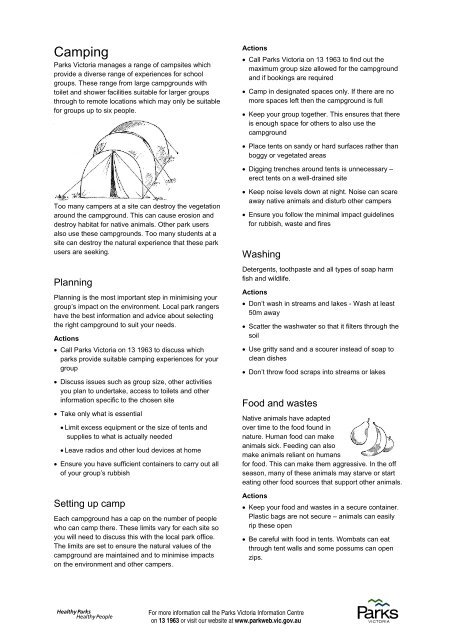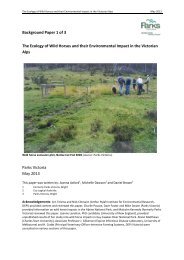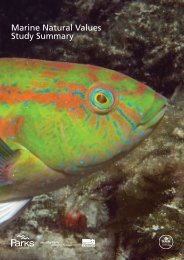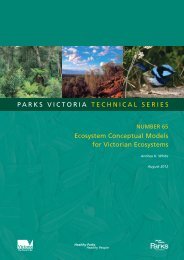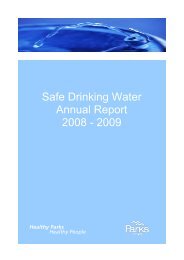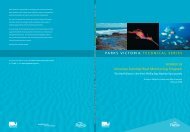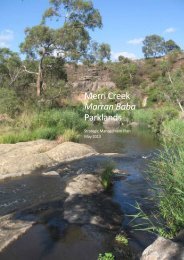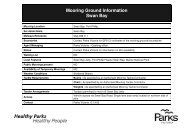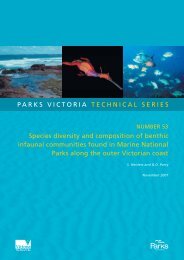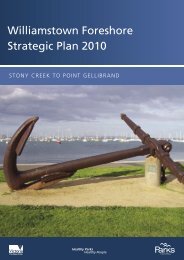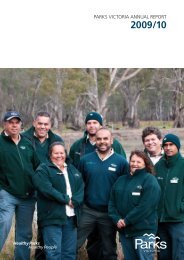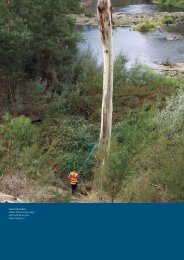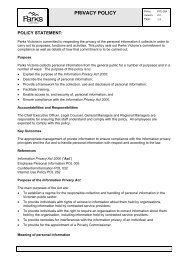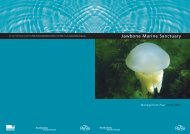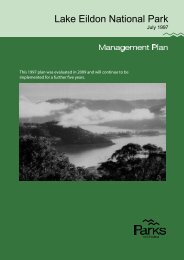Minimal Impact Guidelines for Schools - Parks Victoria
Minimal Impact Guidelines for Schools - Parks Victoria
Minimal Impact Guidelines for Schools - Parks Victoria
You also want an ePaper? Increase the reach of your titles
YUMPU automatically turns print PDFs into web optimized ePapers that Google loves.
Camping<strong>Parks</strong> <strong>Victoria</strong> manages a range of campsites whichprovide a diverse range of experiences <strong>for</strong> schoolgroups. These range from large campgrounds withtoilet and shower facilities suitable <strong>for</strong> larger groupsthrough to remote locations which may only be suitable<strong>for</strong> groups up to six people.Actions Call <strong>Parks</strong> <strong>Victoria</strong> on 13 1963 to find out themaximum group size allowed <strong>for</strong> the campgroundand if bookings are required Camp in designated spaces only. If there are nomore spaces left then the campground is full Keep your group together. This ensures that thereis enough space <strong>for</strong> others to also use thecampground Place tents on sandy or hard surfaces rather thanboggy or vegetated areas Digging trenches around tents is unnecessary –erect tents on a well-drained siteToo many campers at a site can destroy the vegetationaround the campground. This can cause erosion anddestroy habitat <strong>for</strong> native animals. Other park usersalso use these campgrounds. Too many students at asite can destroy the natural experience that these parkusers are seeking.PlanningPlanning is the most important step in minimising yourgroup’s impact on the environment. Local park rangershave the best in<strong>for</strong>mation and advice about selectingthe right campground to suit your needs.Actions Call <strong>Parks</strong> <strong>Victoria</strong> on 13 1963 to discuss whichparks provide suitable camping experiences <strong>for</strong> yourgroup Discuss issues such as group size, other activitiesyou plan to undertake, access to toilets and otherin<strong>for</strong>mation specific to the chosen site Take only what is essential Limit excess equipment or the size of tents andsupplies to what is actually needed Leave radios and other loud devices at home Ensure you have sufficient containers to carry out allof your group’s rubbishSetting up campEach campground has a cap on the number of peoplewho can camp there. These limits vary <strong>for</strong> each site soyou will need to discuss this with the local park office.The limits are set to ensure the natural values of thecampground are maintained and to minimise impactson the environment and other campers. Keep noise levels down at night. Noise can scareaway native animals and disturb other campers Ensure you follow the minimal impact guidelines<strong>for</strong> rubbish, waste and firesWashingDetergents, toothpaste and all types of soap harmfish and wildlife.Actions Don’t wash in streams and lakes - Wash at least50m away Scatter the washwater so that it filters through thesoil Use gritty sand and a scourer instead of soap toclean dishes Don’t throw food scraps into streams or lakesFood and wastesNative animals have adaptedover time to the food found innature. Human food can makeanimals sick. Feeding can alsomake animals reliant on humans<strong>for</strong> food. This can make them aggressive. In the offseason, many of these animals may starve or starteating other food sources that support other animals.Actions Keep your food and wastes in a secure container.Plastic bags are not secure – animals can easilyrip these open Be careful with food in tents. Wombats can eatthrough tent walls and some possums can openzips.For more in<strong>for</strong>mation call the <strong>Parks</strong> <strong>Victoria</strong> In<strong>for</strong>mation Centreon 13 1963 or visit our website at www.parkweb.vic.gov.au


